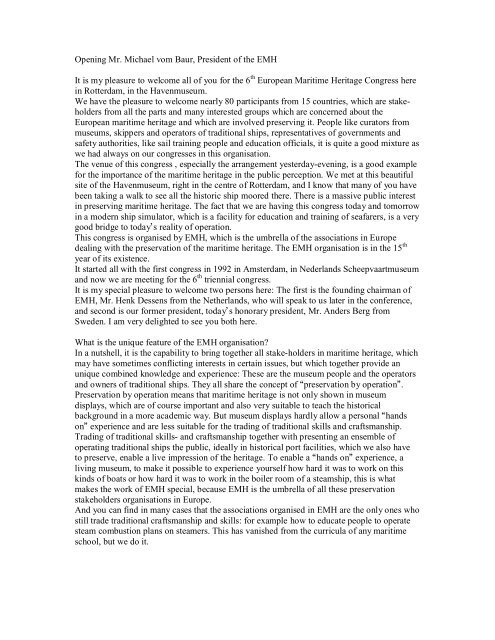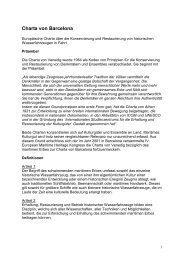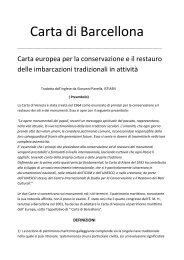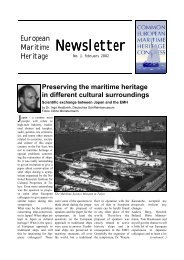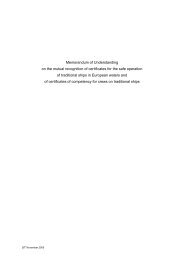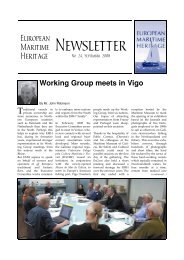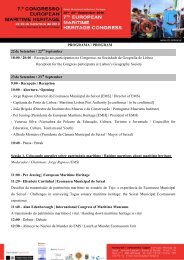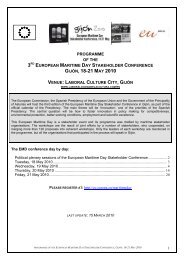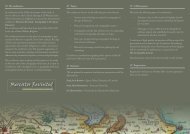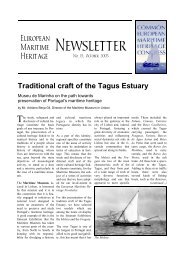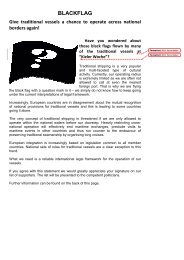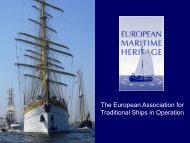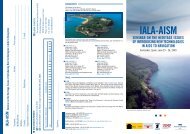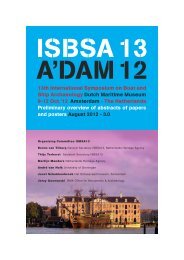opening speech of the president Michael vom Baur of the EMH ...
opening speech of the president Michael vom Baur of the EMH ...
opening speech of the president Michael vom Baur of the EMH ...
Create successful ePaper yourself
Turn your PDF publications into a flip-book with our unique Google optimized e-Paper software.
Opening Mr. <strong>Michael</strong> <strong>vom</strong> <strong>Baur</strong>, President <strong>of</strong> <strong>the</strong> <strong>EMH</strong><br />
It is my pleasure to welcome all <strong>of</strong> you for <strong>the</strong> 6 th European Maritime Heritage Congress here<br />
in Rotterdam, in <strong>the</strong> Havenmuseum.<br />
We have <strong>the</strong> pleasure to welcome nearly 80 participants from 15 countries, which are stakeholders<br />
from all <strong>the</strong> parts and many interested groups which are concerned about <strong>the</strong><br />
European maritime heritage and which are involved preserving it. People like curators from<br />
museums, skippers and operators <strong>of</strong> traditional ships, representatives <strong>of</strong> governments and<br />
safety authorities, like sail training people and education <strong>of</strong>ficials, it is quite a good mixture as<br />
we had always on our congresses in this organisation.<br />
The venue <strong>of</strong> this congress , especially <strong>the</strong> arrangement yesterday-evening, is a good example<br />
for <strong>the</strong> importance <strong>of</strong> <strong>the</strong> maritime heritage in <strong>the</strong> public perception. We met at this beautiful<br />
site <strong>of</strong> <strong>the</strong> Havenmuseum, right in <strong>the</strong> centre <strong>of</strong> Rotterdam, and I know that many <strong>of</strong> you have<br />
been taking a walk to see all <strong>the</strong> historic ship moored <strong>the</strong>re. There is a massive public interest<br />
in preserving maritime heritage. The fact that we are having this congress today and tomorrow<br />
in a modern ship simulator, which is a facility for education and training <strong>of</strong> seafarers, is a very<br />
good bridge to todays reality <strong>of</strong> operation.<br />
This congress is organised by <strong>EMH</strong>, which is <strong>the</strong> umbrella <strong>of</strong> <strong>the</strong> associations in Europe<br />
dealing with <strong>the</strong> preservation <strong>of</strong> <strong>the</strong> maritime heritage. The <strong>EMH</strong> organisation is in <strong>the</strong> 15 th<br />
year <strong>of</strong> its existence.<br />
It started all with <strong>the</strong> first congress in 1992 in Amsterdam, in Nederlands Scheepvaartmuseum<br />
and now we are meeting for <strong>the</strong> 6 th triennial congress.<br />
It is my special pleasure to welcome two persons here: The first is <strong>the</strong> founding chairman <strong>of</strong><br />
<strong>EMH</strong>, Mr. Henk Dessens from <strong>the</strong> Ne<strong>the</strong>rlands, who will speak to us later in <strong>the</strong> conference,<br />
and second is our former <strong>president</strong>, todays honorary <strong>president</strong>, Mr. Anders Berg from<br />
Sweden. I am very delighted to see you both here.<br />
What is <strong>the</strong> unique feature <strong>of</strong> <strong>the</strong> <strong>EMH</strong> organisation?<br />
In a nutshell, it is <strong>the</strong> capability to bring toge<strong>the</strong>r all stake-holders in maritime heritage, which<br />
may have sometimes conflicting interests in certain issues, but which toge<strong>the</strong>r provide an<br />
unique combined knowledge and experience: These are <strong>the</strong> museum people and <strong>the</strong> operators<br />
and owners <strong>of</strong> traditional ships. They all share <strong>the</strong> concept <strong>of</strong> preservation by operation.<br />
Preservation by operation means that maritime heritage is not only shown in museum<br />
displays, which are <strong>of</strong> course important and also very suitable to teach <strong>the</strong> historical<br />
background in a more academic way. But museum displays hardly allow a personal hands<br />
on experience and are less suitable for <strong>the</strong> trading <strong>of</strong> traditional skills and craftsmanship.<br />
Trading <strong>of</strong> traditional skills- and craftsmanship toge<strong>the</strong>r with presenting an ensemble <strong>of</strong><br />
operating traditional ships <strong>the</strong> public, ideally in historical port facilities, which we also have<br />
to preserve, enable a live impression <strong>of</strong> <strong>the</strong> heritage. To enable a hands on experience, a<br />
living museum, to make it possible to experience yourself how hard it was to work on this<br />
kinds <strong>of</strong> boats or how hard it was to work in <strong>the</strong> boiler room <strong>of</strong> a steamship, this is what<br />
makes <strong>the</strong> work <strong>of</strong> <strong>EMH</strong> special, because <strong>EMH</strong> is <strong>the</strong> umbrella <strong>of</strong> all <strong>the</strong>se preservation<br />
stakeholders organisations in Europe.<br />
And you can find in many cases that <strong>the</strong> associations organised in <strong>EMH</strong> are <strong>the</strong> only ones who<br />
still trade traditional craftsmanship and skills: for example how to educate people to operate<br />
steam combustion plans on steamers. This has vanished from <strong>the</strong> curricula <strong>of</strong> any maritime<br />
school, but we do it.
<strong>EMH</strong> is a voluntary association and finances itself since 15 years from membership<br />
contributions, a budget <strong>of</strong> a few ten thousand euros per year. All <strong>the</strong>se contributions are taken<br />
away from <strong>the</strong> preservation budget <strong>of</strong> <strong>the</strong> ships <strong>the</strong>mselves, so every euro paid for <strong>the</strong><br />
umbrella is painful for our members. But we are proud that we could run <strong>EMH</strong> on this base so<br />
far and we thank in particular <strong>the</strong> sponsor companies and organisations, which have enabled<br />
this congress.<br />
.<br />
<strong>EMH</strong> is also <strong>the</strong> (you could say) silent facilitator behind <strong>the</strong> fact that you can still operate<br />
traditional ships in todays world <strong>of</strong> dense maritime regulations. You know that <strong>the</strong> amount <strong>of</strong><br />
regulations has been increased and that is <strong>of</strong> course an answer to <strong>the</strong> increasing traffic density<br />
which is linked with <strong>the</strong> growth <strong>of</strong> trade. But it is possible to operate traditional ships under<br />
this modern safety regime, which is reflecting a different era, enabled by policy activities in<br />
which <strong>EMH</strong> had been involved during <strong>the</strong> last 15 years.<br />
Just to mention two <strong>of</strong> <strong>the</strong>m:<br />
1. <strong>the</strong> Memorandum <strong>of</strong> Understanding <strong>of</strong> European coastal states. Meanwhile we have nine<br />
signatory states which are mutually accepting <strong>the</strong>ir national rules, solving <strong>the</strong> problems in port<br />
state control, and describing a minimum standard. <strong>EMH</strong> is acting as <strong>the</strong> secretariat for <strong>the</strong><br />
follow-up process <strong>of</strong> this Memorandum;<br />
2. <strong>the</strong> Barcelona Charter. This document was signed in 2003. The Barcelona Charter is<br />
providing a guideline for restoration and operation <strong>of</strong> ships in a cultural meaningful way.<br />
These mentioned issues are closely linked with European policy and this is also <strong>the</strong> link with<br />
one <strong>of</strong> <strong>the</strong> main purposes <strong>of</strong> this congress:<br />
The European Union, as you may know, has launched a discussion process to define a future<br />
European maritime policy, <strong>the</strong> so-called Green Book.(You will find copies in <strong>the</strong> foyer). It<br />
is one <strong>of</strong> <strong>the</strong> main purposes <strong>of</strong> this congress to contribute to <strong>the</strong> Green Paper discussion<br />
which will end in a description and joint adoption <strong>of</strong> a future integrated EU maritime policy.<br />
<strong>EMH</strong> welcomes especially, that among o<strong>the</strong>r important issues maritime heritage has a<br />
chapter in <strong>the</strong> Green Paper. There are five <strong>the</strong>matic chapters, <strong>the</strong>y are dealing with sustainable<br />
development <strong>of</strong> <strong>the</strong> coastal regions, with <strong>the</strong> quality <strong>of</strong> living in <strong>the</strong> coastal regions, with a<br />
tool to deal with <strong>the</strong> oceans, maritime policy and, last but not least, maritime heritage.<br />
Maritime heritage is mainly seen as a factor <strong>of</strong> identity for <strong>the</strong> Europeans and for <strong>the</strong><br />
awareness to <strong>the</strong> sea and I can tell you that this chapter has not been written without<br />
contribution <strong>of</strong> <strong>EMH</strong>, it is consequence <strong>of</strong> our activities that this chapter is in <strong>the</strong> Green<br />
Paper. At this part <strong>of</strong> my <strong>speech</strong> I intended to especially welcome <strong>the</strong> head <strong>of</strong> <strong>the</strong> Maritime<br />
Policy Task Force <strong>of</strong> <strong>the</strong> EU, Mr. John Richardson. I just heard that he is on his way to us, he<br />
will speak to us as <strong>the</strong> keynote speaker later after his arrival.<br />
In EU policy, <strong>the</strong> cultural aspect is, according to <strong>the</strong> principle <strong>of</strong> subsidiarity, normally a<br />
domain <strong>of</strong> <strong>the</strong> member states and thats why we are very satisfied, that <strong>the</strong> very important<br />
cultural heritage aspect has become one element <strong>of</strong> <strong>the</strong> EU Commissions future ideas about<br />
maritime policy.<br />
In <strong>the</strong> Green Paper, as I said before, it is mainly seen as a factor <strong>of</strong> identification, as an<br />
identity factor, but maritime heritage is not only this. Operating and preserving maritime<br />
heritage is an economical factor. It is an economical factor because <strong>of</strong> <strong>the</strong> more than 250<br />
events we have in Europe now per annum, which are generating substantial turnover in <strong>the</strong><br />
regions. We have speakers here who will give us some more information about <strong>the</strong><br />
economical dimension<br />
Ano<strong>the</strong>r economical element is <strong>the</strong> cost for maintaining and operating traditional ships which<br />
we have estimated in <strong>the</strong> magnitude <strong>of</strong> hundred million euros per annum, not considering <strong>the</strong>
additional voluntary work done. These expenses <strong>of</strong> <strong>the</strong> traditional ship owners generate<br />
turnover for o<strong>the</strong>rs, e.g. yards, craftsmen, insurances etc. Maritime heritage is indeed an<br />
economical factor, not to be neglected, in my opinion!<br />
Where operated under commercial terms, maritime heritage could even contribute to generate<br />
additional jobs, in particular for those who have difficulties to cope with todays qualification<br />
and speed requirements. As you know <strong>the</strong> preservation <strong>of</strong> ships requires a lot <strong>of</strong> people who<br />
are acquainted with <strong>the</strong> traditional technology, but are also adapted to <strong>the</strong> old way <strong>of</strong> doing<br />
things: a bit slower, handmade with dedication. Today more and more people are not<br />
complying with <strong>the</strong> pattern <strong>of</strong> employment, - we have requirements always to be qualified, to<br />
be faster, to be more adapted to electronics - many people cannot cope with that and hence<br />
<strong>the</strong>y are populating <strong>the</strong> unemployment statistics. If we would realize <strong>the</strong> chances and would<br />
enable to make preservation, operation and maintenance <strong>of</strong> maritime heritage artefacts a<br />
commercial business and allow people to make <strong>the</strong>ir living out <strong>of</strong> it, this could create some<br />
ten thousand jobs in European coastal regions, especially for people who are not able to coop<br />
with todays speed <strong>of</strong> economics. I think, this aspect should be considered in <strong>the</strong> political and<br />
legal framework discussion and I hope that future European maritime policy will help to do<br />
this.<br />
Let me summarize <strong>EMH</strong>s main expectation to <strong>the</strong> Green Paper discussion and to <strong>the</strong> future<br />
European maritime policy, which is tw<strong>of</strong>old:<br />
1. paving <strong>the</strong> way to mobilize financial support, for example by tax exemptions or by o<strong>the</strong>r<br />
financing tools, from <strong>the</strong> private and <strong>the</strong> public sector for <strong>the</strong> preservation <strong>of</strong> maritime<br />
heritage, in <strong>the</strong> same way as it is practice for <strong>the</strong> preservation <strong>of</strong> land base monuments.<br />
High public awareness and prestige, which could be enhanced through a more <strong>of</strong>ficial role<br />
in European policy, could provide <strong>the</strong> necessary attractiveness for private sponsors, as we<br />
have already some supporting this congress, but also open more possibilities for public<br />
support.<br />
2. This is maybe <strong>the</strong> most prominent expectation: we would like to see and to contribute to a<br />
consistent legal framework, in which maritime heritage can be preserved today and also<br />
where <strong>the</strong> operation <strong>of</strong> traditional ships (Preservation by Operation), would be possible in<br />
<strong>the</strong> complex legal framework <strong>of</strong> todays maritime transport and operation.<br />
In this context I think it is a scandal, how in some countries <strong>the</strong> governments and <strong>the</strong><br />
authorities ignore <strong>the</strong> recommendation nr. 1486/2000 <strong>of</strong> <strong>the</strong> Parliamentary Assembly <strong>of</strong> <strong>the</strong><br />
Council <strong>of</strong> Europe. This recommendation deals with <strong>the</strong> maritime and fluvial heritage and has<br />
three bullet points which are supporting <strong>the</strong> operation <strong>of</strong> traditional craft, I would like to<br />
mention <strong>the</strong>m here:<br />
1. The European national governments should encourage <strong>the</strong> preservation <strong>of</strong> <strong>the</strong> maritime<br />
heritage.<br />
2. The use and operation <strong>of</strong> this maritime heritage for public enjoyment and public display<br />
should be encouraged.<br />
3. This should be facilitated by creating easy and adaptable safety framework for traditional<br />
ships.<br />
I can see in some countries that this is completely ignored. On <strong>the</strong> contrary, we are again<br />
discussing issues which we have discussed and solved 15 years ago. We are discussing<br />
whe<strong>the</strong>r wood is allowed to be used on ships because it burns and similar questions, without<br />
any actual reason. As a naval architect I know that modern safety rules are always oriented to<br />
<strong>the</strong> modern trends in merchant shipping which are triggered by economical reasons (e.g.<br />
minimum crew on board, maximum automation, use <strong>of</strong> easy to build modern materials) while
traditional ships represent <strong>the</strong>ir eras modern technology. On most traditional ships <strong>the</strong>re is a<br />
lot <strong>of</strong> crew, thus no need to make and detect everything automatic. It goes without saying that<br />
preserving <strong>the</strong> heritage <strong>of</strong> wooden ships is only possible with original material, even if this<br />
might not be in compliance with modern passive fire protection rules. I would not like to be<br />
misunderstood: for <strong>the</strong> persons on board (may <strong>the</strong>y be pr<strong>of</strong>essional or voluntary crew,<br />
trainees, guest, passengers etc) <strong>the</strong>re cannot be any compromise for safety, and <strong>EMH</strong> is not<br />
asking for such compromise. But <strong>the</strong>re are many ways to safety, not only <strong>the</strong> one in <strong>the</strong><br />
modern shipbuilding standards. Modern navigation and communication equipment for<br />
example is mandatory, but it can also be applied without obstructing <strong>the</strong> historical appearance<br />
<strong>of</strong> a traditional ship.<br />
We have to achieve a different philosophy and that is what we hope <strong>EMH</strong> could achieve in<br />
such a new European policy framework.<br />
I sincerely hope (with <strong>the</strong> words <strong>of</strong> Martin Lu<strong>the</strong>r King:I have <strong>the</strong> dream) that <strong>the</strong> European<br />
Union would be tackling this safety issue for traditional ships with <strong>the</strong> same enthusiasm as<br />
EU regulated <strong>the</strong> size <strong>of</strong> bananas or promoted <strong>the</strong> use <strong>of</strong> olives or regulated <strong>the</strong> operation <strong>of</strong><br />
shepherds (which I recently I heard) or promotes gender issues (to be a bit unfair) and <strong>the</strong>re<br />
would be more examples, you name it!<br />
I am looking forward to fruitful and stimulating papers and discussions at this 6 th European<br />
Maritime Heritage Congress. We will have seven sessions here, which are addressing a lot <strong>of</strong><br />
issues: regional identity, social benefits, wellbeing and tourism, interdependence <strong>of</strong> ships and<br />
harbours, challenges to European policy and also to cultural policy in general.<br />
I hope you will have a enjoiable congress. I can only encourage you to contribute actively.<br />
We are intending to launch a declaration <strong>of</strong> this congress as a part <strong>of</strong> <strong>the</strong> discussion process<br />
for <strong>the</strong> Green Paper, a so-called Rotterdam Declaration. You will find a draft in your files<br />
and you are very welcome to contribute. We intend to take input from <strong>the</strong> congress in order to<br />
make this a good paper, to introduce <strong>EMH</strong>s position into <strong>the</strong> policy discussion process.<br />
It remains for me to thank <strong>the</strong> organisers and hosts <strong>of</strong> <strong>the</strong> Havenmuseum, <strong>the</strong> director Rein<br />
Schuddeboom and Monika Lundstrom and her crew. Thanks also to <strong>the</strong> speakers who have<br />
prepared <strong>the</strong> papers. I wish you a very pleasant congress and as always good talks during <strong>the</strong><br />
lunches, during <strong>the</strong> dinner tonight and in between over a cup <strong>of</strong> c<strong>of</strong>fee.<br />
Thank you.


